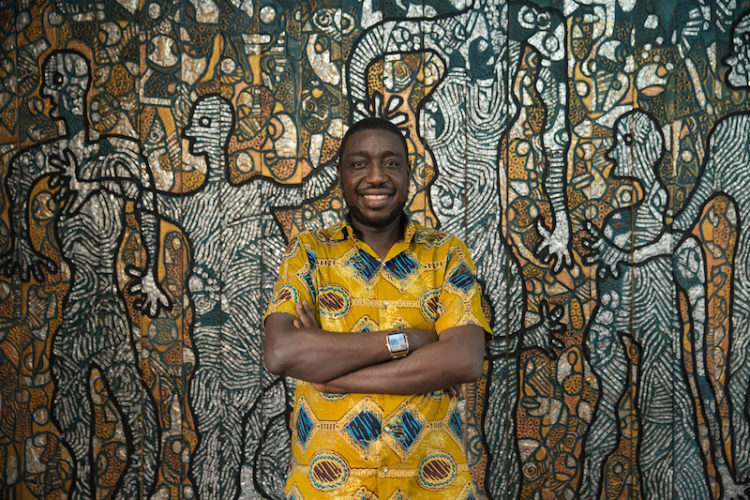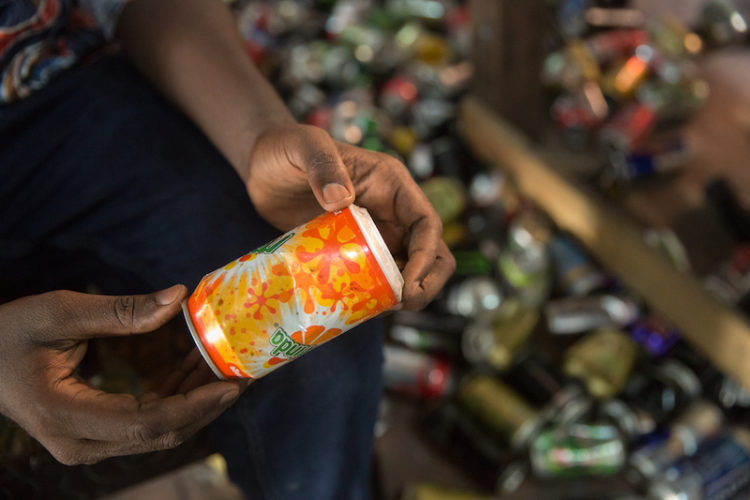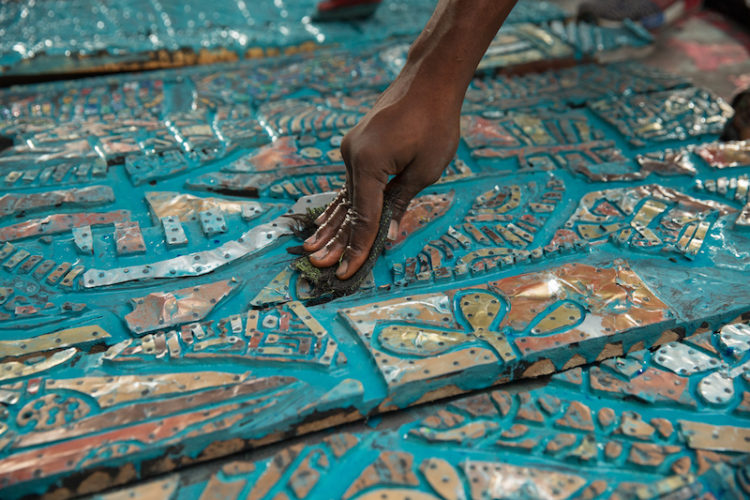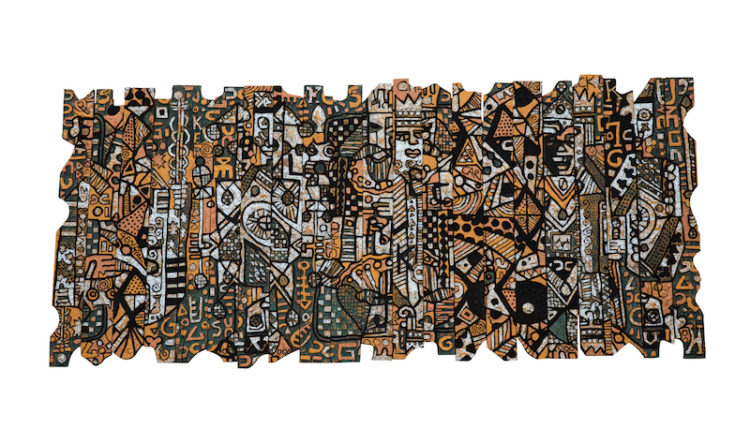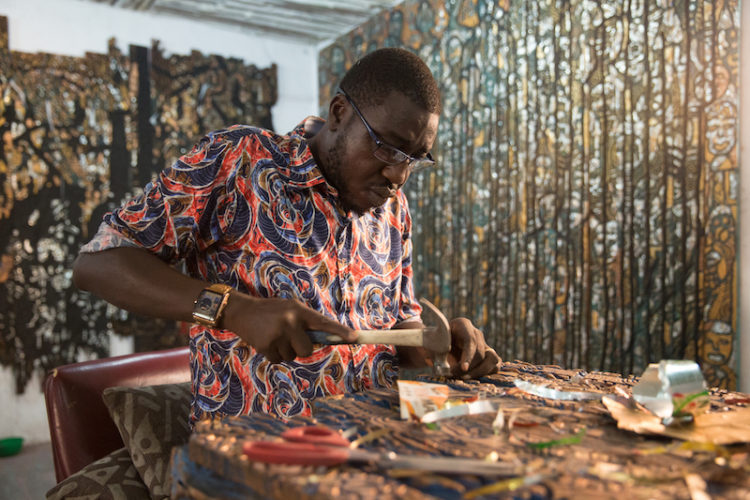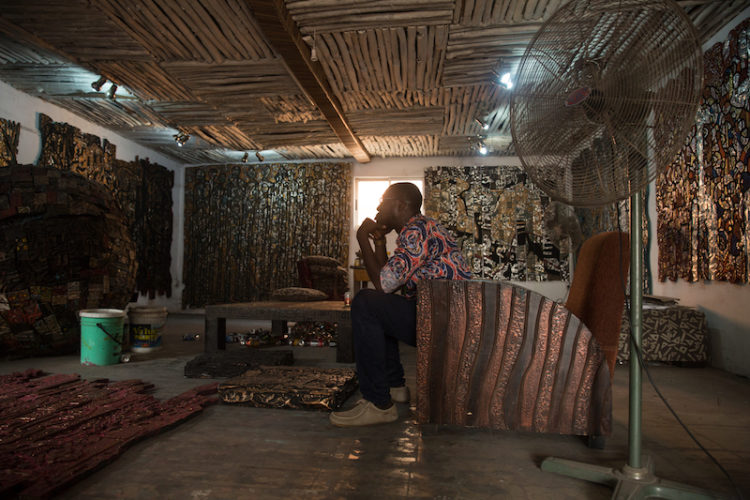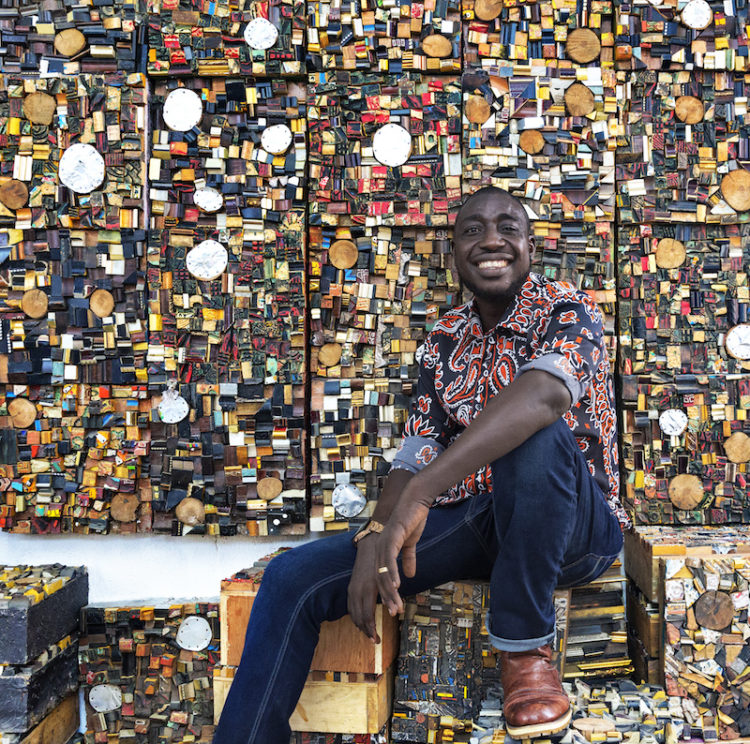In neon orange shorts, Gerald Chukwuma approaches me, smiling, beneath the glittering chandeliers in the lounge of Accra’s dazzling Kempinski Hotel.
It is Friday, 21 April, and tonight marks the opening reception of his exhibition Standing Ovation, at Gallery 1957, which is housed in the hotel. The collection of new works explores the landscape of migration with his signature standout pieces of carved wood, paint and scrap materials.
The party that evening is busy; it is one of Chukwuma’s first solo shows outside his home base of Lagos, Nigeria. ‘His work is actually very relatable,’ Yesha Puplampu, Gallery 1957’s manager, adds. ‘In his work he talks about his life and his struggle, and everyone has their own version of it.’
The exhibition, in Gallery 1957’s intimate space, is like walking into a sparkling treasure trove. The sheer size and detail of his pieces will root you to the spot, examining the handiwork. The painstaking processes of carving, burning, and nailing on tiny pieces of aluminum juxtaposed within such an imaginative, abstract melody of images exude Gerald’s sense of humour and a carefree darkness.
I never use one wood for one work. It is like a piano. They all have their notes.
Old mobile charge cards and empty soft drink cans often find their way into his pieces. The artist explains that he ‘upcycles’ because of the lack of recycling in Nigeria. ‘They’re beautiful, they’re durable, and they’ve got colours,’ Chukwuma says. ‘They’re like a palette for me.’
Although he graduated as a painter from the University of Nigeria, Nsukka, he eventually found the flat texture of canvas limiting. The panels that create the base of Chukwuma’s art are a mixture of four different types of wood, each of which offer their own personality. ‘I never use one wood for one work. It is like a piano. They all have their notes,’ he says. ‘When you mix these notes and play them, they give you music.’
Since he can remember, Chukwuma has been an artist: as a child he’d draw comics and cover his bedroom walls in paintings of Donald Duck. His mother and father had more traditional ideas about his future. At secondary school, Chukwuma’s parents informed his teachers they didn’t want him to focus on art but study for a ‘real’ job.
Rebellion does not come cheap for a student in Nigeria.
Still, he spent every day after class in the art department, watching the students for hours as they mixed pigments and painted. Post-secondary, Chukwuma’s parents pushed him to take marketing at a polytechnic institute. ‘They didn’t understand how I felt.’
After two years, without telling his parents, he dropped out of marketing and enrolled himself in University of Nigeria, Nsukka, to study art. ‘That was really tough,’ Chukwuma remembers. ‘I couldn’t ask for school fees, they didn’t know where I was, I couldn’t tell them about anything.’
Rebellion does not come cheap for a student in Nigeria. School fees are expensive. But Chukwuma hawked, selling goods in the street to make whatever cash he could. ‘It was tough, but I loved this art. There’s nothing else that makes me happier. My life is art.’ In Nsukka, Chukwuma lived underneath a tree so that he could afford an education. ‘I used to uproot cassava and roast it over fire in the bush just to have something to eat. I didn’t have money! I had to pay my school fees.’
The artist’s eyes are wide behind his spectacles as he tells me his story, his body leans forward in the chair and his hands are engaged in his tale as he walks me through his memories. His past difficulties are told with humour; it makes me wonder if success has given him this attitude, or if optimism is a natural trait.
Sometimes I don’t like to sell my work. They’re like children.
Chukwuma admits that, despite the risks that faced him as he jumped on his path to the art world, fear never entered his mind: ‘The first day at University of Nigeria, Nsukka, I was just glad that I was finally a professional artist. I knew what I loved and I moved on.’
Two lecturers during his time in Nsukka had a profound impression on him as an artist, and Chukwuma credits their unwavering support for building his confidence in his subliminal processes. ‘Inspiration, for me, comes from everywhere. The best works that I’ve done, I didn’t think about them. I didn’t plan them.’
His works always begin without a sketch. ‘I don’t think art should be organised because thoughts are not organised. They erupt like a volcano. You cannot tell the lava where to go.’ You can sense duality: There are two Geralds – the artist and the observer – impatiently waiting to see the outcome. ‘That’s what excites me! Even I don’t know what will happen.’
Standing in front of the works in the gallery, he tells me he finds it difficult to let go. ‘I have found that every time I finish a work, a part of me leaves me. That’s why sometimes I don’t like to sell my work. They’re like children,’ he explains. ‘I give birth to them. It’s mixed feelings. I feel also that they should get married, because they shouldn’t live with me. But I feel sad that they want to get married.’
The goal is to employ, over the next decade, up to 100 artists in the factory he’s set up.
It is a moment of transition for the artist. He is now becoming an entrepreneur and considering moving from Lagos where he has lived for 12 years. He plans to spend more time producing ‘Afro-contemporary furniture.’ This will be no solo feat, however. The goal is to employ, over the next decade, up to 100 artists in the factory he’s set up.
It is a response to the dire employment situation for artists. Chukwuma recalls his time in university when he couldn’t find a job as an artist for even a day. He was offered marketing jobs, but Chukwuma said no. ‘Either you are practicing art or you’re doing nothing.’ The furniture factory is an opportunity for emerging professional artists to have practical employment in their field, and to expand the definition of art, from expensive objects in galleries to everyday things. Despite the successful turnout of his new show, Gerald believes no good artist is truly satisfied. ‘If you get contented, you’re probably not in it for art,’ he says. ‘It would end. Art cannot finish.’
‘My parents didn’t know what art was. They wanted me to be a doctor or engineer or fly a plane,’ Gerald says. ‘But I fly my plane now. You know how I fly my plane? I get a piece of wood and I carve it, and I get into it and I fly. I create my future.’
Gerald Chukwuma, Standing Ovation, will be on at Gallery 1957, Accra from 21 April – 31 May 2017, gallery1957.com

